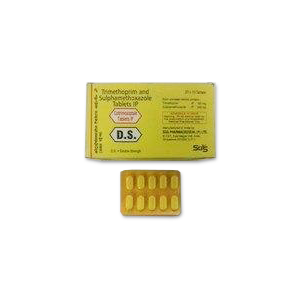
We accept Bitcoins
Get 10% discount!!!
Cotrimoxazole D.S. (Trimethoprim + Sulphamethoxazole)

The image may differ from the actual product
Weight:
800/160 mg
Set:
60 tabs
Per pill price:
$1.83
Availability:
In stock
Price:
$110.00
Manufacture: SGS Pharmaceutical (P) LTD
Cotrimoxazole D.S. (Trimethoprim + Sulphamethoxazole) is an antibiotic that is used to treat bacterial infections such as bladder infections, skin infections or chest infections.
Why is this medication prescribed?
Cotrimoxazole is used to treat certain bacterial infections, such as pneumonia (a lung infection), bronchitis (infection of the tubes leading to the lungs), and infections of the urinary tract, ears, and intestines. It also is used to treat 'travellers' diarrhea. Cotrimoxazole is a combination of Trimethoprim and Sulfamethoxazole and is in a class of medications called sulfonamides. It works by stopping the growth of bacteria.
How should this medicine be used?
Cotrimoxazole comes as a tablet to take by mouth. It usually is taken twice a day but may be taken up to four times a day when used to treat certain severe lung infections. Follow the directions on your prescription label carefully, and ask your doctor or pharmacist to explain any part you do not understand. Take Сotrimoxazole exactly as directed. Do not take more or less of it or take it more often than prescribed by your doctor.
You should begin to feel better during the first few days of treatment with Сotrimoxazole. If your symptoms do not improve or if they get worse, call your doctor.
Take Сotrimoxazole until you finish the prescription, even if you feel better. Do not stop taking Сotrimoxazole without talking to your doctor. If you stop taking Сotrimoxazole too soon or skip doses, your infection may not be completely treated and the bacteria may become resistant to antibiotics.
What special precautions should I follow?
Before taking co-trimoxazole,
1) tell your doctor and pharmacist if you are allergic to Сotrimoxazole, any other medications, or any ingredients in Cotrimoxazole tablets. Ask your pharmacist for a list of ingredients.
2) tell your doctor and pharmacist what other prescription and nonprescription medications, vitamins, nutritional supplements, and herbal products you are taking or plan to take. Be sure to mention the following: Amantadine; Angiotensin converting enzyme inhibitors such as Benazepril (Lotensin), Captopril (Capoten), Enalapril (Vasotec), Fosinopril (Monopril), Lisinopril (Prinivil, Zestril), Moexipril (Univasc), Perindopril (Aceon), Quinapril (Accupril), Ramipril (Altace), and Trandolapril (Mavik); anticoagulants ('blood thinners') such as Warfarin (Coumadin, Jantoven); Cyclosporine (Gengraf, Neoral, Sandimmune); oral diabetes medications such as Glipizide (Glucotrol), Glyburide (Diabeta, Glynase), Metformin (Fortamet, Glucophage), Pioglitazone (Actos), Repaglinide (Prandin), Rosiglitazone (Avandia); Digoxin (Lanoxin); diuretics ('water pills'); Indomethacin (Indocin); Leucovorin (Fusilev); medications for seizures such as Phenytoin (Dilantin, Phenytek); Memantine (Namenda); Methotrexate (Trexall); Pyrimethamine (Daraprim), and tricyclic antidepressants such as Amitriptyline (Elavil), Amoxapine (Asendin), Desipramine (Norpramin), Doxepin (Adapin, Sinequan), Imipramine (Tofranil), Nortriptyline (Aventyl, Pamelor), Protriptyline (Vivactil), and Trimipramine (Surmontil). Your doctor may need to change the doses of your medications or monitor you carefully for side effects.
3) tell your doctor if you have or have ever had thrombocytopenia (less than normal number of platelets) caused by taking sulfonamides or trimethoprim; megaloblastic anemia (abnormal red blood cells) caused by folate deficiency (low blood levels of folic acid), phenylketonuria (PKU, an inherited condition in which a special diet must be followed to prevent mental retardation), or liver or kidney disease. Your doctor may tell you not to take Cotrimoxazole. Cotrimoxazole should not be used in children less than 2 months of age.
4) tell your doctor if you have or have ever had severe allergies; asthma; low levels of folic acid in the body which may be caused by malnutrition (you do not eat or cannot digest the nutrients needed for good health); human immunodeficiency virus (HIV) infection; porphyria (an inherited blood disease that may cause skin or nervous system problems); thyroid disease; or glucose-6-phosphate dehydrogenase (G-6-PD) deficiency (an inherited blood disease).
5) tell your doctor if you are pregnant, plan to become pregnant, or are breast-feeding. If you become pregnant while taking Cotrimoxazole, call your doctor immediately. Cotrimoxazole can harm the fetus.
6) plan to avoid unnecessary or prolonged exposure to sunlight and to wear protective clothing, sunglasses, and sunscreen. Cotrimoxazole may make your skin sensitive to sunlight.
What special dietary instructions should I follow?
Unless your doctor tells you otherwise, continue your normal diet.
Drink plenty of fluids during your treatment with Cotrimoxazole.
What should I do if I forget a dose?
Take that missed dose as soon as you remember it. However, if it is almost time for the next dose, skip the missed dose and continue your regular dosing schedule. Do not take a double dose to make up for a missed one.
What side effects can this medication cause?
Cotrimoxazole may cause side effects. Tell your doctor if any of these symptoms are severe or do not go away:
nausea
vomiting
loss of appetite
If you experience any of the following symptoms, call your doctor immediately:
rash
itching
sore throat
fever or chills
severe diarrhea (watery or bloody stools) that may occur with or without fever and stomach cramps (may occur up to 2 months or more after your treatment)
shortness of breath
cough
unusual bruising or bleeding
yellowing of the skin or eyes
paleness
red or purple skin discolorations
joint or muscle pain
What should I know about storage and disposal of this medication?
Keep this medication in the container it came in, tightly closed, and out of reach of children. Store it at room temperature and away from excess heat and moisture (not in the bathroom).

 English
English 









